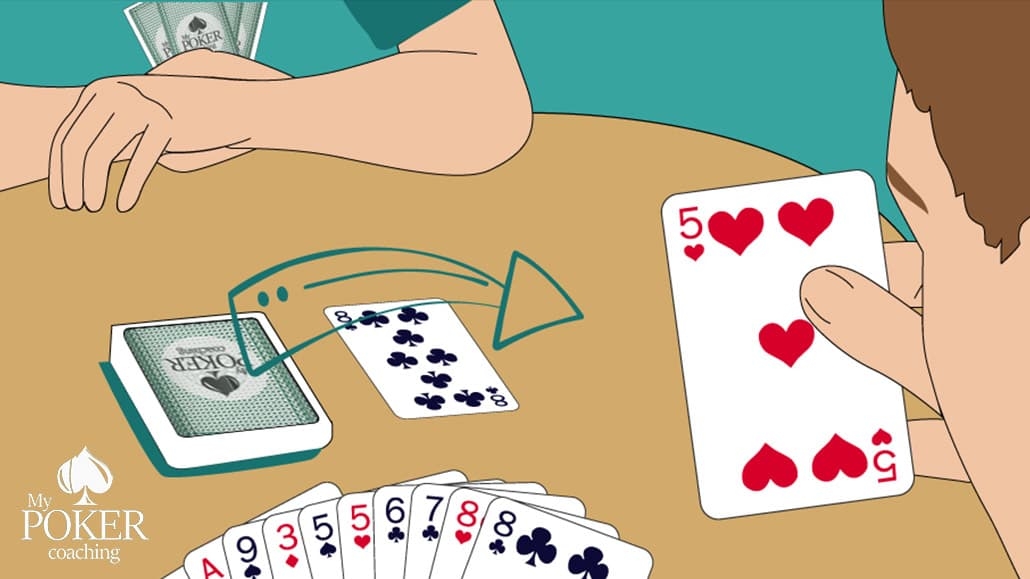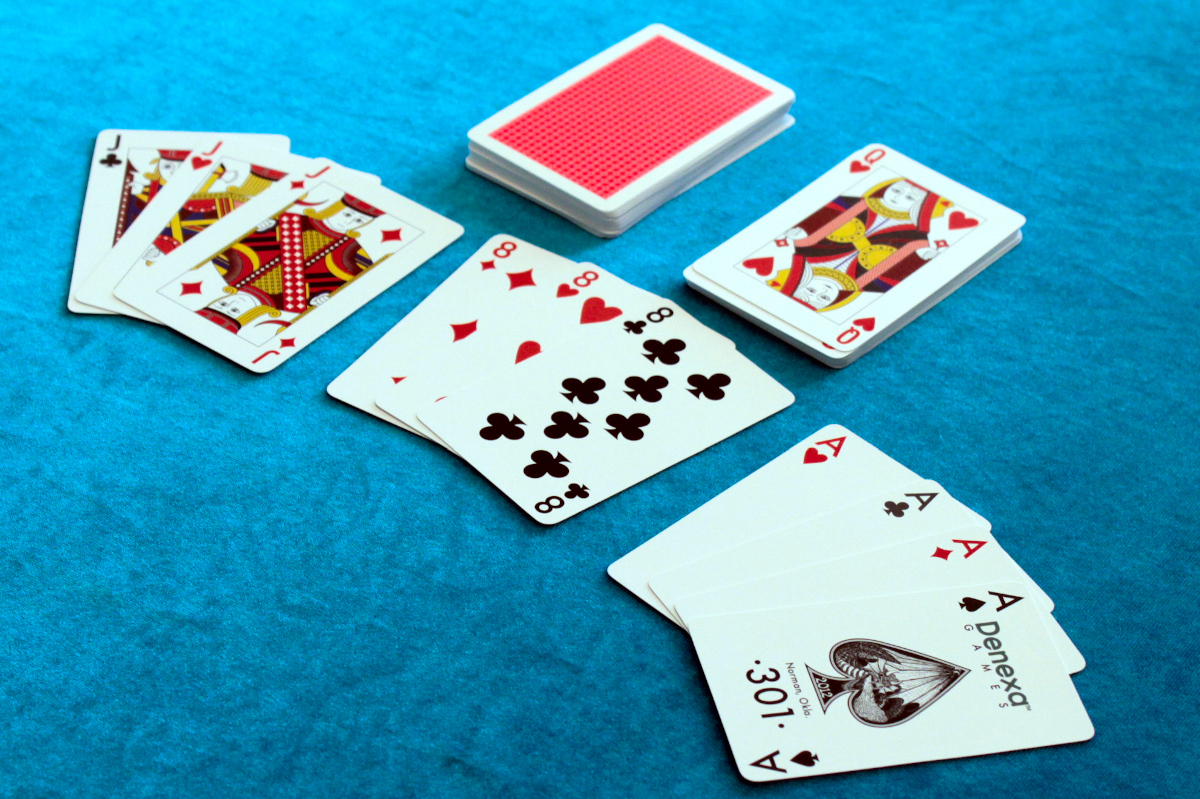Number Of Cards Dealt In Gin Rummy
| see also: Gin-Rummy Strategy and Playing tips Gin-Rummy and the 50th card Gin-Rummy Tips. Learn to Play Gin-Rummy Good and Poor Gin-Rummy Combinations. Play Gin-Rummy better Discarding in Gin-Rummy. Understanding Safety values Gin-Rummy Advanced tutorial. Learn how to play Gin-Rummy and win Gin-Rummy: Oklahoma strategy guide Gin-Rummy Internet Tournaments Play Gin-Rummy Online. Gin-Rummy Tournaments |
click here to play gin-rummy online with other players from your browser |
To play Gin Rummy, try to score more points than your opponent by making combinations of 3 or more cards in your hand. Gin Rummy is usually played over several rounds until one player gets more than 100 points and wins the game. To get started, choose either you or your opponent to be the dealer, and deal out 10 cards to each of you. The Pack Gin Rummy is played with a 52 card deck, the wild cards (jokers) are not used. It is best to use two decks, so that while one player deals the cards, the opponent can shuffle the other deck.
Number of Players.
Gin-Rummy is a two-player card game.
The Deck
Gin is played with a standard 52-card pack of playing cards. Aces are played only as low; the ranking from low-to-high is A-2-3-4-5-6-7-8-9-10-J-Q-K.
The cards have values as follows: Face cards (K,Q,J) 10 points, Ace 1 point, Number cards are worth their value.
Dealing
The dealer to the first round is chosed randomly, dealership alternates from round to round. The dealer deals 10 cards to each player, face down, one at a time, alternately. The 21st card dealt, called the 'upcard', is placed face-up in a central location known as the discard pile. The remainder of the pack is called the 'stock' and is placed beside discard pile.


Object of the Game
Each player tries to form 'melds' which consist of three or four cards of the same rank called 'set' or 'group' (such as the 2 of hearts, 2 of diamonds and 2 of spades), or 'sequences' (or 'runs'), which are three or more cards of consecutive rank in the same suit (such as the 2, 3, 4 of hearts). A second objective is to reduce the count of the unmatched cards in a player's hand to less than the count of his opponent and the summary value of these unmatched cards.
A card can belong to only one combination at a time - you cannot use the same card as part of both melds.
The Play
The non-dealer plays first. At each turn, a player must take either the upcard (top open card of the discard pile) or draw the top closed card of the stock and then discard one card face up on the discard pile. TIP: If your opponent's discard makes or increases a meld in your hand, pick it up.
When a player has taken the upcard (open card), he may not discard this card at the same turn and has to discard some other card. TIP: If you know or think that a card might make or increase a meld for your opponent, keep it in your hand.
On the first play of the hand, the draw is done in a special way. If the non-dealer does not wish to take the upcard, he skips and the dealer may have the first turn by taking the upcard. If the dealer also does not want the upcard, the opponent draws the top card from the stock, and play proceeds.
Knocking
The play ends when a player knocks. This can be done on any turn (including the first), immediately after drawing, provided that the value of the unmatched cards in player's hand (after he discards) does not exceed 10 points. Having knocked, he discards one card down and spreads the hand of 10 cards, arranged into melds and unmatched cards, that called 'deadwood'. Knocking with no unmatched cards at all is called going gin, and earns bonus 25 points.
A player who is able to knock is not forced to do it, he may choose instead to carry on playing, to try to get a better score. TIP: If you are not playing to gin, knock as soon as possible.
The opponent of the player who knocked must then spread their cards face-up, arranging them into sets where possible. If the knocker did not go gin, the opponent is also allowed to lay off any unmatched cards by using them to extend the existing sets laid down by the knocker - by adding a fourth card of the same rank to a group of three, or further consecutive cards of the same suit to either end of a sequence.
If a player goes gin, the opponent is not allowed to lay off any cards.
Note that a knocker player is not permitted to lay off any cards on the unmatched cards in the opponent's hand.
The play also ends if the stock pile is reduced to two cards, and the player who took the third last card discards without knocking. In this case the hand is cancelled, there is no score, and the same dealer deals again.
Note that a player is not permitted to lay off any cards on the unmatched cards in the opponent's hand.
Scoring and Undecutting
When a player gets gin he scores 25 points 'for gin' plus the deadwood in the opponent's hand. In the other case each player counts the total value of their unmatched cards. If the knocker's count is lower, the knocker scores the difference between the two counts.
When a player knocks without gin, and the opponent's deadwood total is the same or less than the knocker's, the opponent 'undercuts' and scores a bonus of 20 points, plus the difference in the counts for the two players' unmatched cards.
Next Hand
There are several methods of selecting of the next dealer:
The loser of each hand deals next. The winner of each hand deals next. Alternative dealing.
Game Score
The player who first scores 100 points or more wins the game. (Some players may prefer to play to 150, 200, or 300 points.) The winner adds to his score a 100-point game bonus. (If the opponent has not won a hand during the game, then he doubles his entire score, including the game bonus. This is called a shutout or 'schneider.') Each player then adds to his score 25 points for every hand he has won, a bonus called a line or a box.

Gin Only
This version for two players is simply Gin Rummy where both players must go for gin, and the winner is the player who gins first. Knocking with a deadwood is impossible.

Oklahoma Gin
This very popular version of Gin Rummy is just like the original except for one key rule: The rank of the upcard fixes the maximum number of points with which a player may knock in that deal. Thus, if the upcard is a five, the knocker must have 5 points or less. Face cards count 10. When an ace is the knock card, neither player may knock with a count of 1 point; instead, each must play for a gin hand.